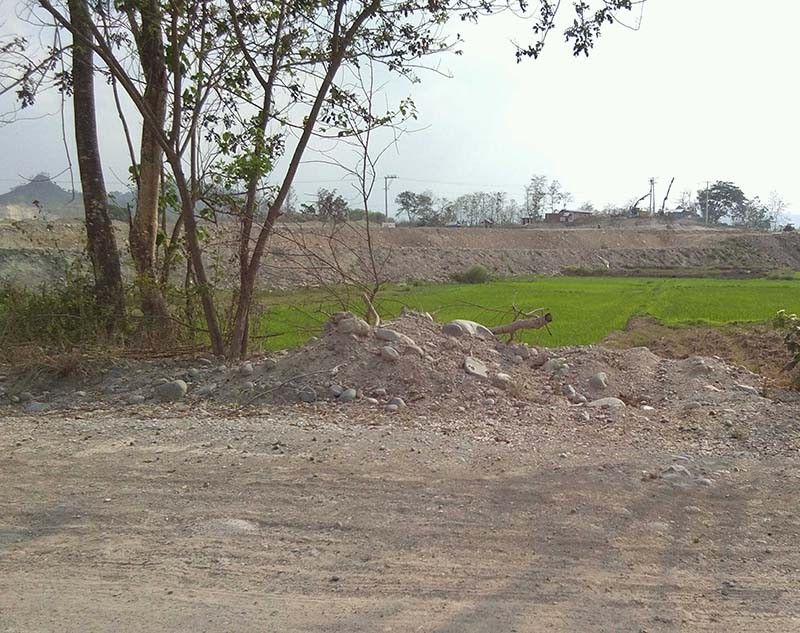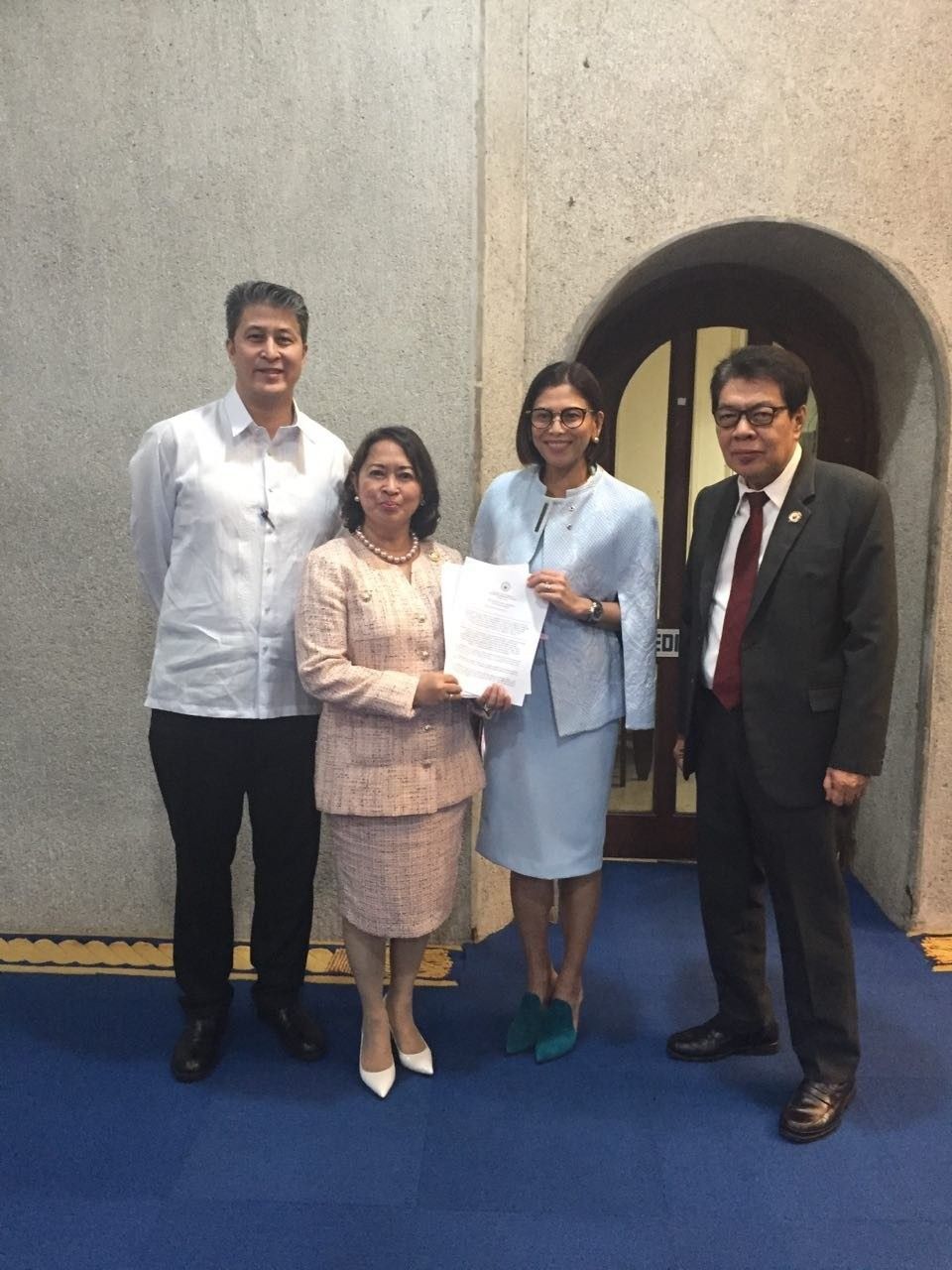Farmers' issues and updates

A full probe on the unabated vegetable smuggling in the country is being sought in Congress by the filing of House Bill 108.
Co-authored by Benguet lawmaker Eric Go Yap and Davao City’s Paolo Duterte, HB 108 is urging the House’s committee on agriculture and food to conduct an inquiry, in aid of legislation, on the continued smuggling of agricultural products into the country despite existing laws. — The STAR/Artemio Dumlao
New irrigation systems in Camarines Sur will benefit 2,532 farmers tilling 1,963.12 hectares of agricultural land in the province, the National Immigration Administration says.
The projects, inuagurated in late July, include the P26.160-million Pump House and Farm Pond at Tigman- Hinagyanan-Inarihan River Irrigation System (THIRIS) in Calabanga; P14.077-million Punta Diamante Pump Irrigation System in Canaman and the P6.686-million rehabilitated Taisan CIS Dam (Sibagat Small Reservoir Irrigation Project) in Minalabac.
Organic farming can bail central Mindanao farmers out from low earnings due to production challenges and climate change, agriculture officials said.
The prospects of organic farming were discussed during the March 29-30 Regional Food Security Summit in Koronadal City, capital of South Cotabato province.
The summit, attended by more than 300 representatives from central Mindanao’s agriculture and fisheries sectors, was organized by the office of Arlan Mangelen, regional executive director of the Department of Agriculture-12.
Agriculture Undersecretary Zamzamin Ampatuan told reporters Tuesday there is an indication that the country would rise as an Asian organic farming hub soon.
— The STAR/John Unson
Rights group Karapatan says reported attacks on and harassment of farmers in Hacienda Yulo in Laguna and in Isabela province are alarming, stressing the agricultural sector is already burdened by the effects of the pandemic.
"Poor peasants are increasingly more vulnerable to the impacts of the pandemic and the crisis of high prices of food and other basic commodities," Karapatan says in a release.
"Like the majority of the populace, what they need most now is assistance, support and ultimately, the right to land and life. However, there has been no let-up from life-threatening attacks they experience, whether from state forces or armed security and goons of local landlords."
Tobacco farmers are branching out to becoming cattle growers.
A new initiative taken to increase the income of farmers, the National Tobacco Administration (NTA) pitched the Beef Cattle Production Assistance Project (BCPAP) allocating P10 million from the Tobacco Farmers Production Assistance or Investment Outlay for 2020, under its Integrated Farming and Other Income Generating Activities Project (IFOIGAP).
A select group of tobacco growers in Abra, Ilocos Norte, Ilocos Sur, La Union, Pangasinan, Isabela and Cagayan will receive this November 250 ready-to-breed upgraded Brahman heifers for the project, NTA Administrator Robert Victor Seares Jr. says.
Seares says the initiative “will help jumpstart the beef cattle industry in the tobacco growing provinces and will also forward the vision of the Department of Agriculture for advancing food sufficiency in the country.” — The STAR/Artemio Dumlao
Sama-samang Artista para sa Kilusang Agraryo "rages against" the killing of activist farmer Jose Jerry Catalogo in Escalante City, Negros Occidental while he was feeding his carabao on June 23, the group says in a release.
Catalogo was an officer of a farmers' association affiliated with the National Federation of Sugar Workers and is the father of political prisoner Cheryl Catalogo.
"Jose Catalogo's murder took place three days after farmers Zaldy Meraya and Bebe Tobino were strafed to death in their hut in Northern Samar, and peasant organizer Harold Tablazon was gunned down with 32 bullets in Iloilo; and 16 days before the Anti-Terror Bill, railroaded by Congress after President Duterte had certified it urgent, could lapse into law," SAKA points out.
Sen. Francis Pangilinan calls for government support for farmers as he calls for a look into the implementation of the Rice Tarrification Law, particularly the provisions in the law to for subsidies and support for tillers.
"This farmers' crisis may soon become a food crisis, lalung-lalo na at anihan na ng dry season crop at wala pang plano paano lagyang preno ang pagbagsak ng kita ng mga magsasaka ngayong Marso at Abril," he says, citing findings by the Federation of Free Farmers that rice growers lost P68.18 billion last year due to the removal of controls on imported rice.
Philippine agriculture performance was flat in 2019, growing by a measly 0.7% from the 0.6% recorded in 2018, according to the Philippine Statistics Authority.
Growth in Q4 in 2019 was at 0.4% pulled down by the livestock sector amid an outbreak of African Swine Fever, the STAR's Louise Maureen Simeon reports.
For the whole 2019, the crops and livestock subsectors went down one percent each. It was only the fisheries sector that managed to pull off a two percent growth from a negative performance the previous year @PhilippineStar
— Maureen Simeon (@maureensimeon) January 22, 2020
Sen. Imee Marcos has assured rice farmers of P6.9 billion in additional aid by December, in the form of palay purchases or cash, using undisbursed funds from the Department of Social Welfare and Development (DSWD).
Marcos allayed worries that a memorandum of agreement among the DSWD, Department of Agriculture and National Food Authority to purchase palay from local farmers “was held in abeyance” following a Supreme Court decision in October preventing budget allocations for items not specified in the national budget through a mere resolution in Congress.
Both the Senate and the House of Representatives earlier approved joint resolutions to convert cash aid from the DSWD’s Pantawid
Pamilyang Pilipino Program (4Ps) into rice, to be bought from local farmers unable to compete with cheap rice imports. -- The STAR/Artemio Dumlao
The National Movement for Food Sovereignty will march to the National Food Authority's Central Luzon Office in Cabanatuan City on Monday morning "to urge the government to take proper, adequate, and urgent measures to address the situation of the local rice industry."
"This mobilization is part of the nationwide protest of different farmers organizations and other major rice industry stakeholders to let the public understand the hardships that rice farmers and other stakeholders are undergoing at present and to express our disenchantment and frustration over the government’s failure to address the crisis at hand," NMFS says.
Bracing for the full impact of the Rice Tarrification Law (RTL) at the onset of the harvest season in November, farmers, cooperatives and the clergy in Tabuk City, Kalinga are calling for the amendment of the law to make it less onerous and injurious to the local rice industry.
Tabuk is the rice granary of the highland Cordillera region.
Farmers, cooperatives aided by the clergy are particularly urging that the functions of the National Food Authority (NFA) stripped by the RTL is restored because “(NFA) has become practically powerless to regulate the rice industry and placing local farmers completely at the mercy of free market forces.”
The groups are also asking government to restore the techniques to make rice importation harder, a practice being done in other World Trade Organization (WTO) member countries.
A second look at the RTL should also provide for farmer representation in the Rice Competitiveness Enhancement Fund (RCEF) steering committee, they said.
A farmers’ forum in Tabuk, initiated by the major cooperatives led by the Tabuk Multi-purpose Cooperative (TAMPCO) and joined in by the Kalinga and Apayao Religious Sector Association (KARSA), gathered farmers wanting to listen to their concerns and came up with a united stand on the crisis created by RTL. — The STAR/Artemio Dumlao
Raul Montemayor, national manager of the Federation of Free Farmers (FFF) and committee chairman for food staples and for international trade of the National Council for Agriculture and Fisheries, an advisory body of the Department of Agriculture, though claiming that the House version of the RTL kept the functions of the NFA intact, legislators made it very easy to import by removing the power of the NFA to require licenses.
Sen. Risa Hontiveros has filed a resolution calling for the release of subsidies to rice farmers and calling on the government to implement more palay-buying to address the needs of farmers hit by low rice prices.
Hontiveros, in her resolution, says it has “become evident based on government data and testimony from palay farmers themselves that the mismanagement by relevant officials and delayed launch of rice competitiveness enhancement program and safety nets for farmers has meant that things will become far worse for our rice farmers before they become better.”
She says the government release funds under the Rice Competitiveness Enhancement Fund in the 2019 national budget and the 2019 rice import tariff revenues as direct cash assistance to farmers.
Tariff revenues are estimated to be between P3.5 billion and P6.5 billion.
"Kailangan natin bigyang ayuda ang ating mga magsasaka na nalulubog sa pagkalugi," Hontiveros says, financial assistance under the Rice Tarrification Competitiveness Enhancement Fund, which was meant to help farmers cope with the removal of limits on rice importation.
The law removing limits on rice imports "endangers the lives and livelihood of Filipino farmers and peasant women that are already one of the most vulnerable sectors of the Philippine society," according to Rural Women Advocates.
The Rice Liberalization Law eased restrictions on importing rice but also imposes tariffs that are supposed to fund assistance to and the modernization of rice farming in the Philippines.
"But this, in actuality, bred more problems for local farmers and peasant women than it actually solved. Because of the influx of imported rice, which is also mandated and directed by WTO, local farmers and peasant women have no other choice but to lower their price as dictated by private traders," RUWA says in a statement.
Palay, or unhusked rice, is bought at P7-P14 per kilogram but, RUWA said, the price of rice has not gone down.
"This situation is further evidence that the interest of the Filipino farmers and peasant women are the least of the concerns of our policymakers," RUWA also says.
Members of the House of Representatives have filed a joint resolution to authorize the use of the P10-billion appropriation for the Rice Competitive Enhancement Fund as "a special emergency fund for direct cash transfers to rice farmers."
Rice farmers have been complaining of low prices of palay (unhusked rice) within months of enactment of a law removing limits on the importation of rice.
"The large drop of farm-gate price of palay has resulted in huge income losses for rice farmers and the industry, which is now estimated to be around P60 billion," the joint resolution reads.

Action for Economic Reforms says the Agriculture department's zero-interest loans of P15,000 are a good start in addressing rice farmers affected by low farmgate prices and the entry of cheaper imported rice due to the removal of importation limits.
The loans, which are payable in eight years, "will initially benefit some 100, 000 farmers owning lands one hectare and below," AER says. There are an estimated two million rice farmers in the Philippines.
"We hope that Unconditional Cash Transfer (UCT) can be provided for those which will not be covered by the [Agriculture Credit Policy Council] loan. Let us not forget in the narrative the remaining 500,000 small farm owners who are also suffering from the worsening situation in our market," AER president Jessica Reyes-Cantos says.
Groups, including the National Federation of Peasant Women and Bantay Bigas, meanwhile say the loan program included in the rice liberalization law "wouldn't be of help as it does not address the falling prices of palay and the high cost of production."
The groups say "genuine agrarian reform" and developing the local industry through free land distribution and support services and subsidies are "the only solution" to ensure food security and self-sufficency.
The National Irrigation Administration has acquired 18 dump trucks worth P64.599 million for the construction and maintenance of irrigation projects across the country, the agency says in a press statement.
"For CY 2017, NIA purchased 34 units of light/transport vehicles and 17 units of heavy equipment. For CY 2018, NIA acquired 91 units of light/transport vehicles and 18 units of heavy equipment. Meanwhile, five units of heavy equipment and 91 units of light/transport vehicles are set for procurement this 2019," NIA also says.
The Philippine farm sector contracts 1.27% in the second quarter of 2019 against growth in 0.12% in the same period in 2018, The STAR's Maureen Simeon reports.
In the first half of 2019, the agriculture sector is also down 0.24% from the 0.63-percent increase last year.
Senate President Pro Tempore Ralph Recto has filed a bill to condone, or grant amnesty for, loans owed by agrarian reform beneficaries of the Comprehensive Agrarian Reform Program.
The measure, if enacted, will write off unpaid amortizations, interests, penalties, surcharges on loans secured under CARP.
ARBs need to pay for land awarded to them under CARP but because of the costs of farming and because of loss of income due to crops destroyed by typhoons and drought and similar calamities, many fail to do so.
Under Recto's bill, once the arrears are condoned,“the agrarian reform beneficiaries shall be deemed rightful owners of the lands awarded to them.”
Recto said former landowners will still be paid for the land covered by CARP and distributed to farmers.
"Their right to be paid on time and based on the legal contracts will be honored and will not be impaired," he says.
The Department of Agriculture recognizes on its website that "the agriculture, forestry, and fisheries sector is pivotal in generating employment for about a third of the country’s labor force, thereby reducing poverty and inequality for three-fourths of the poor who are in the rural areas."
It also says that the sector is key to providing raw materials to the manufacturing and service sectors of the Philippines.
The DA also says that its mission is "to help and empower the farming and fishing communities and the private sector to produce enough, accessible and affordable food for every Filipino and a decent income for all."
Follow this thread for updates on this vital sector.
- Latest
- Trending





























